FC Precision Casting
| Availability: | |
|---|---|
| Quantity: | |
Detailed Feature:
 | Product Name | China Manufacturer Customized Stainless Steel Electric Motor Shaft | ||||
| Precision Processing | OEM | |||||
| Tolerance/Precision | CT9 | |||||
| Product Materials | Steel, Iron, Steel, Gray Iron,Nodular Cast Iron | |||||
| Process Technology | Precision Casting | |||||
| Surface Treatment | Machining Or Spay Painting | |||||
| Size | Customed | |||||
| Anti-rust | Antirust oil | |||||
| File Formats | PDF,Auto CAD, Solid work,JPG,Pro E | |||||
| FOB Port | Ningbo Or Shanghai | |||||
Applications:
Shafts are a key component in most rotating equipment.It is used for axles, bolts, forged connecting rods, crankshafts, torsion bars, light gears, guide rods etc.
Fuchun is a remarkable company engaged in offering superior quality Electric Motor Shaft. This range is designed and developed by our skilled professionals in compliance with the international quality standards. Known for its optimum performance, compact design, easy installation, corrosion resistant nature and longer service life, this Electric Motor Shaft is widely recognized in the global market.
To meet the varied needs of the clients, this range is offered in different technical specifications at highly competitive prices.
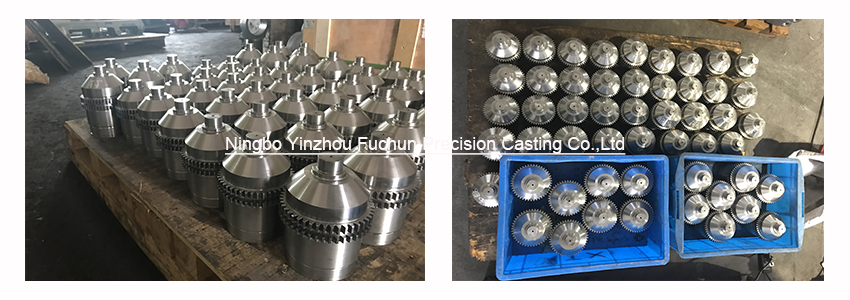
Advantages:
★ Professional technical team provides high quality technical supporting;
★ High quality materials can increase service life;
★ Precision control of size makes assembly more reasonable and perform more efficiently.
Detailed Feature:
 | Product Name | China Manufacturer Customized Stainless Steel Electric Motor Shaft | ||||
| Precision Processing | OEM | |||||
| Tolerance/Precision | CT9 | |||||
| Product Materials | Steel, Iron, Steel, Gray Iron,Nodular Cast Iron | |||||
| Process Technology | Precision Casting | |||||
| Surface Treatment | Machining Or Spay Painting | |||||
| Size | Customed | |||||
| Anti-rust | Antirust oil | |||||
| File Formats | PDF,Auto CAD, Solid work,JPG,Pro E | |||||
| FOB Port | Ningbo Or Shanghai | |||||
Applications:
Shafts are a key component in most rotating equipment.It is used for axles, bolts, forged connecting rods, crankshafts, torsion bars, light gears, guide rods etc.
Fuchun is a remarkable company engaged in offering superior quality Electric Motor Shaft. This range is designed and developed by our skilled professionals in compliance with the international quality standards. Known for its optimum performance, compact design, easy installation, corrosion resistant nature and longer service life, this Electric Motor Shaft is widely recognized in the global market.
To meet the varied needs of the clients, this range is offered in different technical specifications at highly competitive prices.

Advantages:
★ Professional technical team provides high quality technical supporting;
★ High quality materials can increase service life;
★ Precision control of size makes assembly more reasonable and perform more efficiently.
Company Information:
Ningbo Yinzhou Fuchun Precision Casting Co., Ltd was set up in 1988, located in the beautiful coastal city of Ningbo, on China's eastern seaboard. One of the leading foundries in China, we specialize in casting of carbon steel, alloy steel, gray steel, stainless steel and ductile iron materials. With an annual output capacity of 10000 metric tons, our products range from 100 grams to 600 kilograms in weight.
We also produce mechanical parts for worldwide purchasers and can manufacture as per customers' drawings. Until now, our products can be mainly put into the following categories: valve parts, parts for rail and subways, parts for mining machinery, automobile fittings, parts for hydraulic machinery, parts for project machinery and other parts.
With 7 medium frequency electric furnaces for production, we also have spectrographs, metallographic analyzers, hardness testers, ultrasonic test machines, magnetic particle flaw detectors, impact testers, tension testers and other inspection instruments.
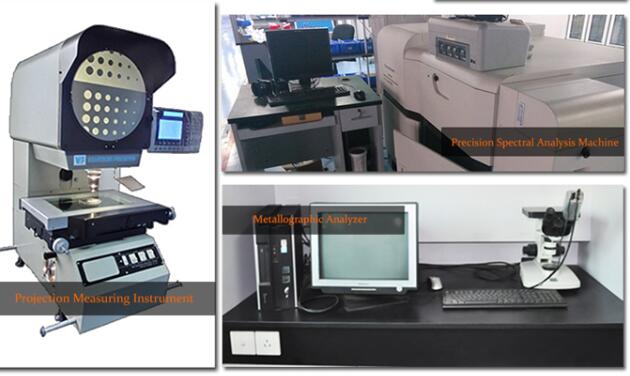

Furthermore, our machining capability is very strong, with a whole line of boring, milling and drilling lathes, 13 CNC lathes, 4 CNC machining centers, and related metallurgical machinery.
Our Services:
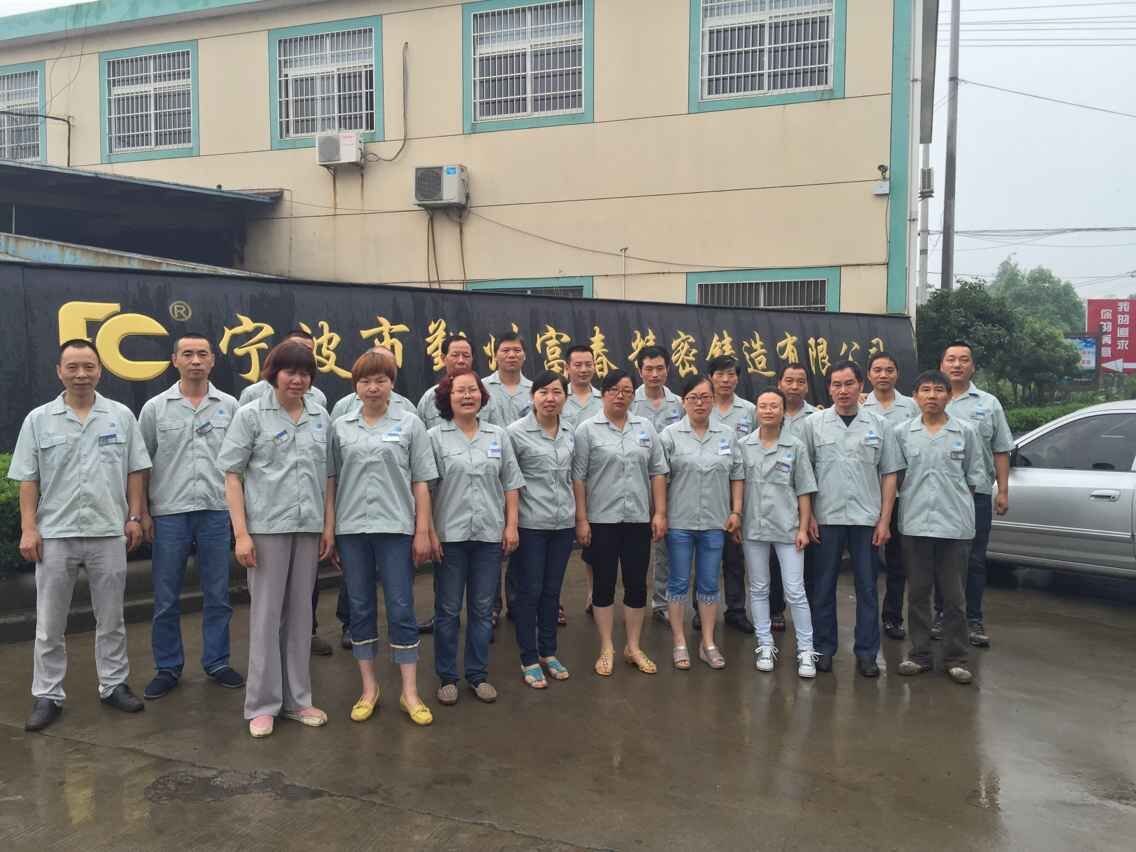 | ❤ Satisfied Quality; |
| ❤ Competitive Price; | |
| ❤ Professional Sales & QC Team; | |
| ❤ Quick Delivery; | |
| ❤ Perfect After-sales Service. |
We believe that good quality and honesty help us win customers. We are looking forward to working with you and establishing mutually beneficial business relationships with you. If you are interested in our products, please feel free to contact us for more details.
Company Information:
Ningbo Yinzhou Fuchun Precision Casting Co., Ltd was set up in 1988, located in the beautiful coastal city of Ningbo, on China's eastern seaboard. One of the leading foundries in China, we specialize in casting of carbon steel, alloy steel, gray steel, stainless steel and ductile iron materials. With an annual output capacity of 10000 metric tons, our products range from 100 grams to 600 kilograms in weight.
We also produce mechanical parts for worldwide purchasers and can manufacture as per customers' drawings. Until now, our products can be mainly put into the following categories: valve parts, parts for rail and subways, parts for mining machinery, automobile fittings, parts for hydraulic machinery, parts for project machinery and other parts.
With 7 medium frequency electric furnaces for production, we also have spectrographs, metallographic analyzers, hardness testers, ultrasonic test machines, magnetic particle flaw detectors, impact testers, tension testers and other inspection instruments.


Furthermore, our machining capability is very strong, with a whole line of boring, milling and drilling lathes, 13 CNC lathes, 4 CNC machining centers, and related metallurgical machinery.
Our Services:
 | ❤ Satisfied Quality; |
| ❤ Competitive Price; | |
| ❤ Professional Sales & QC Team; | |
| ❤ Quick Delivery; | |
| ❤ Perfect After-sales Service. |
We believe that good quality and honesty help us win customers. We are looking forward to working with you and establishing mutually beneficial business relationships with you. If you are interested in our products, please feel free to contact us for more details.
Certification Introduction:
Ningbo Yinzhou Fuchun Precision Casting Co., Ltd put great emphasis on our quality control system to assure our products have the best quality. We have already passed ISO9001, TUV-PED and BV approvals. 80% of our products are exported to Europe, the USA, and Australia where they are well received by customers, with whom we have established long term business relationships.

Certification Display:
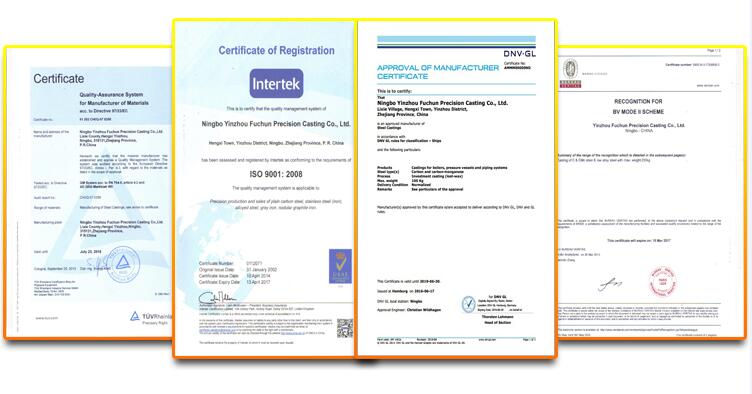
Certification Introduction:
Ningbo Yinzhou Fuchun Precision Casting Co., Ltd put great emphasis on our quality control system to assure our products have the best quality. We have already passed ISO9001, TUV-PED and BV approvals. 80% of our products are exported to Europe, the USA, and Australia where they are well received by customers, with whom we have established long term business relationships.

Certification Display:

Packaging Display:
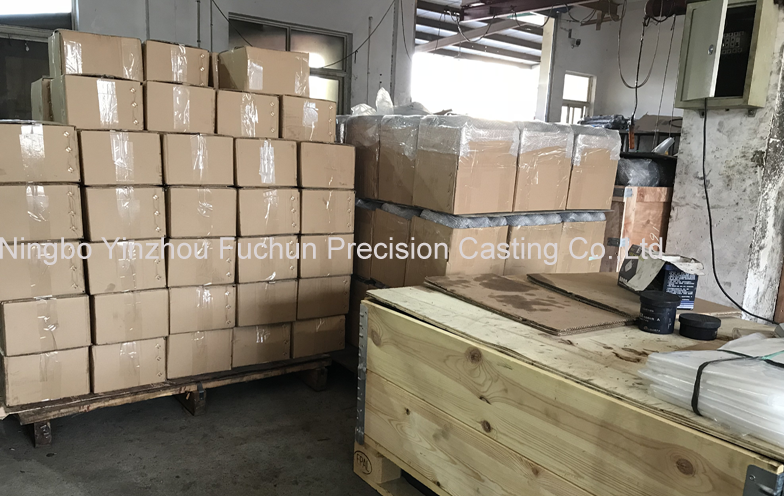 | Wooden box with plastic bag; |
| EUR-pallet with pallet collar and plastic bag; | |
As customer's requirements. |
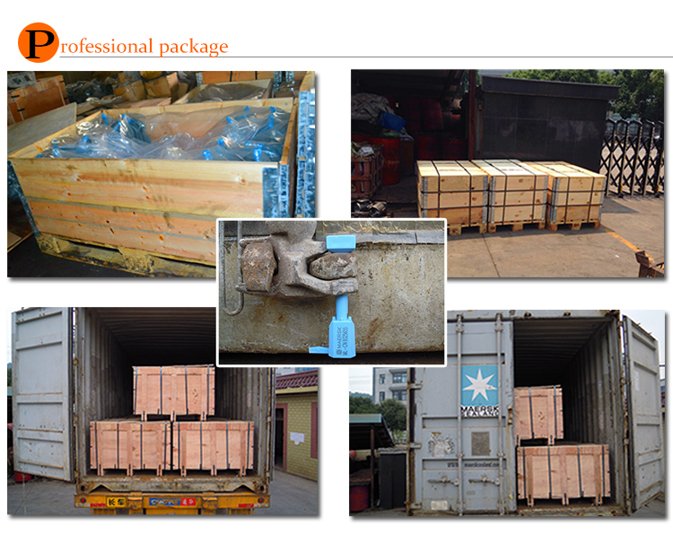
Transport Details:
All kinds delivery way we can satisfy as customer's require.
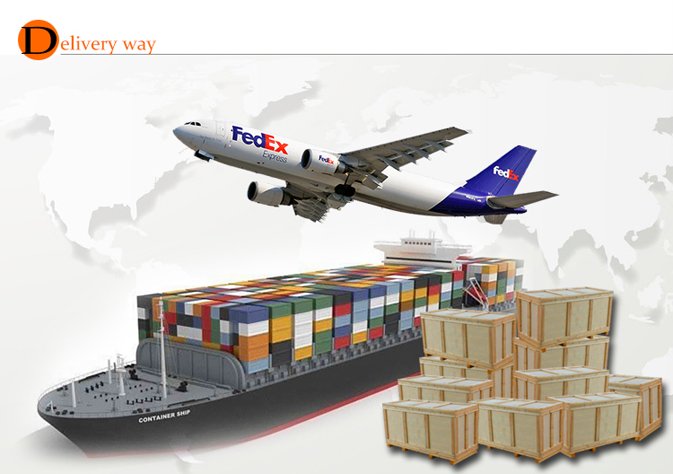
Packaging Display:
 | Wooden box with plastic bag; |
| EUR-pallet with pallet collar and plastic bag; | |
As customer's requirements. |

Transport Details:
All kinds delivery way we can satisfy as customer's require.

One-Stop Custom Casting & OEM Manufacturing